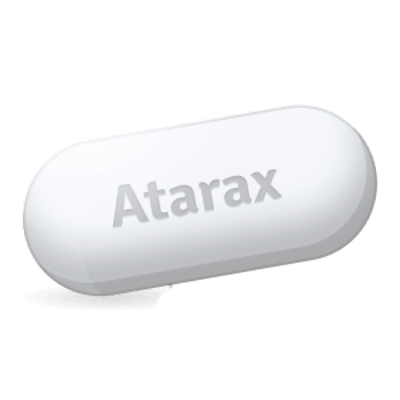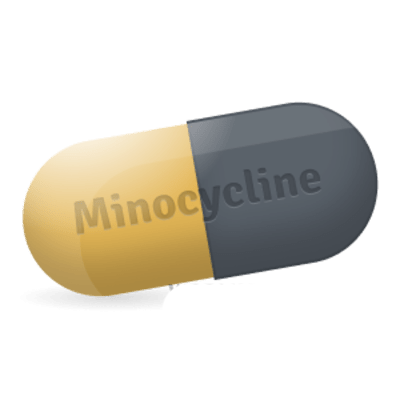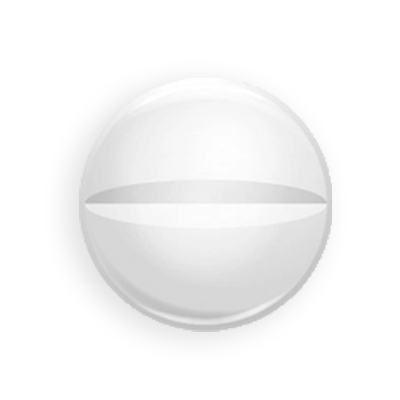When I started taking Atarax, I really didnt expect such quick relief. I had terrible allergies and the itching was interfering with my sleep. This drug helped soothe my skin and restore normal night sleep.

Atarax
- Quality products
- Support 24/7
- Fast delivery
What is it?
Atarax is a hydroxyzine-based drug with sedative and anxiolytic properties. It is an antihistamine that also has an anticholinergic and sedative effect and is used to treat allergies. The drug has a positive effect on cognitive abilities, improves memory and attention. It is important to note that it does not cause addiction, which is a significant advantage when using it. In addition, Atarax relaxes smooth muscles, has a bronchodilator and analgesic effect, and moderately reduces the secretion of gastric juice. The drug can be used as an antiemetic and muscle relaxant. It also reduces itching in urticaria, eczema, dermatitis and other skin diseases. After oral administration, hydroxyzine is converted to its active form – cetirizine, due to which it acts as an antihistamine.
Composition
The composition of Atarax includes a number of specific components, each of which has its own significance in providing its therapeutic effect. The main active substance is hydroxyzine, which is responsible for the sedative and antihistamine effect of the drug. Hydroxyzine also has anticholinergic properties.
- Hydroxyzine is the main active component that provides a sedative and antihistamine effect.
- Excipients - stabilizers, fillers and substances that maintain the shape and stability of tablets.
Each of these components is important in determining the pharmacological effects of Atarax, ensuring its effectiveness and safety in the treatment of various conditions.
How to use?
Atarax should be used as prescribed by a doctor, as this is important for achieving the best therapeutic effect. The general daily dose for adults is 25 to 100 mg, divided into several doses during the day. In psychiatry, doses can be tripled, but this requires careful monitoring.
- Take Atarax orally, as directed by a doctor or instructions, dividing the dose into several doses.
- The duration of standard treatment is about four weeks, but can be changed depending on the patients condition.
- For elderly people and patients with renal or hepatic insufficiency, the dosage should be reduced.
Use of this drug without a doctors prescription is not recommended, as it may lead to unexpected reactions or insufficient effectiveness of treatment.
How does it work?
Atarax works by blocking H1-histamine receptors, which reduces allergic reactions such as itching and swelling. Due to its anticholinergic activity, the drug reduces smooth muscle tone, which is manifested by relaxation of the bronchi and a decrease in the migration of inflammatory cells.
In addition, Atarax has a sedative effect due to its effect on the central nervous system, calming the patient and relieving nervous tension. This allows it to be used in various conditions associated with anxiety and stress. It is worth considering that after taking the drug, hydroxyzine is converted into cetirizine, which continues to have an anti-allergic effect.
These mechanisms allow Atarax to effectively eliminate allergy symptoms, while simultaneously having a calming and relaxing effect.
Indications
Indications for the use of Atarax are wide and cover various medical conditions associated with allergic reactions and nervous tension. The drug is effective in cases where it is necessary to relieve itching or reduce inflammation.
- Skin allergic reactions: urticaria, eczema, dermatitis.
- Bronchial asthma and chronic obstructive pulmonary disease when it is necessary to relax the bronchi.
- Anxiety conditions associated with increased nervous tension.
- Preparation for surgical interventions to achieve a sedative effect.
- Therapy of postoperative and chronic pain due to the analgesic effect.
These indications make Atarax a universal drug in the treatment of various pathologies and conditions.
Contraindications
Contraindications to the use of Atarax include a number of conditions and diseases in which the use of the drug may be unsafe. Physicians should carefully assess the risks before prescribing this drug.
- Hypersensitivity to hydroxyzine or cetirizine.
- Pregnancy and breastfeeding.
- Patients with porphyria, a disease associated with a disorder of pigment metabolism.
- Use in combination with MAO inhibitors.
- Severe arrhythmia or tendency to seizures.
These contraindications emphasize the need for medical supervision when prescribing Atarax.
Side effects
Like most medications, Atarax can cause side effects that vary in severity. Some are temporary and disappear as the body adapts to the drug.
- Drowsiness and fatigue, which can reduce concentration.
- Dizziness, loss of coordination.
- Dry mouth and thickening of mucus in the respiratory tract.
- Anxiety, irritability, stomach discomfort.
- Blurred vision, tremors, loss of appetite and nausea.
If serious reactions or allergic symptoms occur, stop taking the drug immediately and seek medical attention.
Frequently asked questions
Atarax Reviews and Experiences
I used Atarax to reduce anxiety before a big presentation. It really helped me cope with my nerves and stay calm, although I did feel a little dizzy due to the sedative effect.
Atrax has done a good job of treating my dermatitis symptoms. Itching and irritation have been significantly reduced, although I did notice some slight drowsiness at first, but it went away after a few days of taking it.









